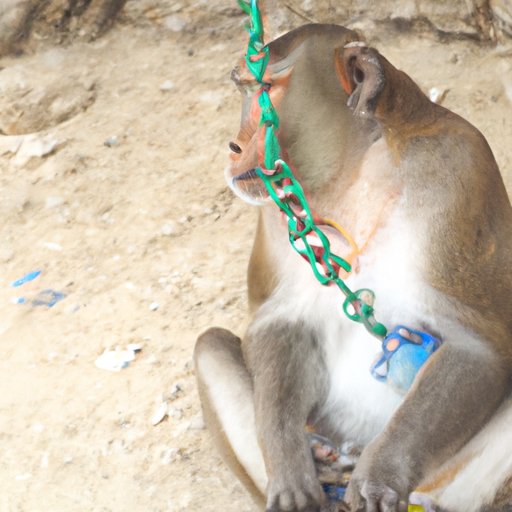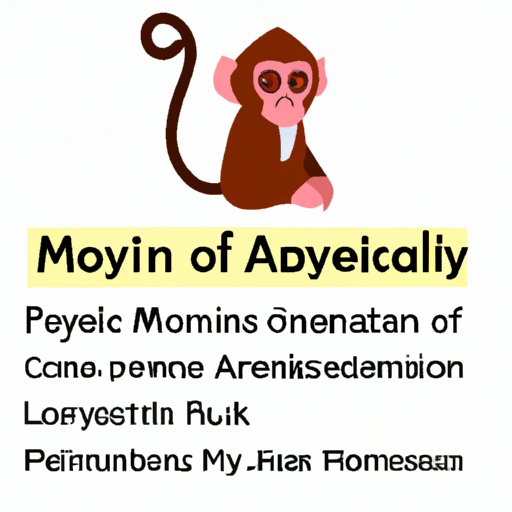
Introduction
Having a monkey as a pet is a unique and interesting choice for animal lovers, but it is also an important decision that requires careful consideration. In this article, we’ll explore the pros and cons of owning a pet monkey, the legal requirements for keeping one, how to make your home safe for them, training and socializing your pet monkey, the costs associated with raising one, alternatives to monkey ownership, and real stories from pet monkey owners.
The Pros and Cons of Owning a Pet Monkey
There are advantages and disadvantages to owning a pet monkey. Let’s take a look at some of them:
Benefits of Having a Monkey as a Pet
Monkeys are intelligent and social animals that can bring a lot of joy and companionship to their owners. They are entertaining and have unique personalities that can brighten up any home. In addition, they can form strong bonds with their owners and enjoy spending time with them.
Drawbacks/Challenges of Owning a Monkey
Owning a pet monkey also comes with its challenges. Monkeys are complex animals that require a lot of attention and care. They can be difficult to train and can become aggressive if they feel threatened or uncomfortable. In addition, they can carry diseases that can be harmful to humans.

Legal Requirements for Owning a Pet Monkey
It’s vital to know the laws and regulations about owning a monkey in your state before purchasing one. Some states prohibit the ownership of primates or require specific permits or licenses. Here are some essential legal requirements:
Overview of Laws/Regulations on Owning a Monkey
Many countries and states, including the United States, restrict or prohibit the ownership of primates. In some states, pet monkeys are legal, but specific requirements, such as permits or licenses, must be fulfilled.
Information on Permits, Housing Requirements, and Veterinary Care
Obtaining the necessary permits, adhering to housing requirements, and providing regular veterinary care are some of the strict legal requirements set forth by the government. It’s essential to understand and comply with all laws and regulations to avoid being fines and facing legal trouble.
How to Make Your Home Safe for a Pet Monkey
Monkeys can be mischievous and inquisitive, so it’s crucial to monkey-proof your home before bringing one home. These are some steps to take:
Steps to Take to Create a Safe Environment for a Pet Monkey
Close off areas such as staircases and pools where your pet monkey might be in danger. Secure windows, doors, and electrical outlets. Store all toxic or dangerous household cleaners and chemicals in secure cabinets. Keep kitchen and bathroom cabinets locked.
Importance of Monkey-Proofing Your Home
Monkey-proofing your home is crucial to prevent your pet monkey from injuring themselves or damaging your property. Since monkeys require a lot of exercise and playtime, they can be active and curious, endangering themselves and your property.
Tips for Training and Socializing Your New Pet Monkey
When you bring home a pet monkey, you want him to become a well-behaved and happy member of your household. Here are some methods for training a pet monkey:
Methods for Training a Pet Monkey
The first step in training your pet monkey is to establish a bond of trust and establish yourself as their primary caregiver. Positive reinforcement and repetition are often used with pet monkeys. They learn and respond well to rewards for doing well and ignoring bad behavior.
Importance of Socialization for a Pet Monkey
Since monkeys are social animals, it’s essential to socialize them so they can interact with people and other animals. Socializing your monkey from an early age can prevent them from becoming aggressive and anxious.
The Costs of Owning a Monkey
Monkeys, as pets, have high maintenance costs. These are some costs associated with owning a pet monkey:
Overview of All Expenses Associated with Owning a Pet Monkey
Initial purchasing can cost thousands of dollars. Additionally, daily expenses such as food and vet visits, can run into hundreds of dollars each month. Monkeys also need constant upkeep such as enclosure cleaning and environmental enrichment tools.
Information on Initial Purchase, Vet Bills, and Food Costs
Pet monkeys are expensive to purchase, mainly expense due to their limited availability in the market. Regular vet visits are compulsory, and the bill for test and checkup from a primatologist is very high. The cost of feeding these little creatures is also quite high.
Alternatives to Owning a Monkey as a Pet
If you are not comfortable owing a monkey, here are some alternatives to consider:
Introduction to Other Safe and Legal Pet Options
There are other delightful pet options that are legal, ethical, and safe to own. Cats, dogs, ferrets, and birds are just a few of the many choices you have to consider.
Compare and Contrast to Owning a Pet Monkey
The freedom and care required for a monkey may not be appealing to some pet owners. By comparing pets as alternatives to owning a monkey, you may find a more suitable pet option that meets your lifestyle and objectives better.
Real Stories from Monkey Owners
Not every experience with owning a pet monkey is positive. Talking to other pet owners and learning from their experiences can help you make a more informed decision. Here are some insights from actual pet monkey owners:
Importance of Learning from Other Individuals’ Experiences
Knowing more about the triumphs and shortcomings of owning monkeys will improve our understanding and better inform our decision to bring a primate into our homes.
Conclusion
Bringing home a pet monkey needs careful consideration. As explained, there are both advantages and disadvantages to monkey ownership, legal requirements to know, costs and safety requirements to consider, and consequent alternatives to explore. We hope this article has helped you make a more informed decision regarding pet monkey ownership.




